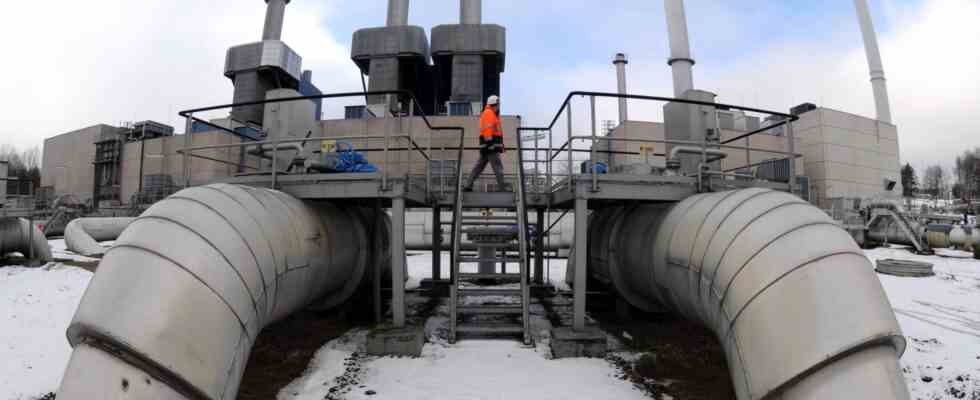Status: 03/03/2022 11:00 a.m
Can Germany forego oil and gas supplies from Russia in the short term? This question is urgent in view of possible further sanctions. One thing is clear: the step would have a high price.
The demand is getting louder and louder: Germany should refrain from supplying raw materials from Russia. Instead of letting Russia turn off the gas tap, Germany should turn off the money tap on Russia. This is what the Ukrainian ambassador in Berlin, Andriy Melnyk, is demanding. The previous sanctions against Russia were not enough. “Many loopholes were left, and now it is necessary to close all these loopholes and dry up all channels, all financial flows for Putin’s war machine and ultimately this embargo on imports of strategic raw materials,” said Melnyk.
A stop on gas, oil, coal from Russia: is it possible? What would be the consequences? Currently, the dependencies are still large. “From one day to the next, that’s quite a feat. You have to say that clearly because we get more than 50 percent of our gas from Russia,” says energy expert Claudia Kemfert from the German Institute for Economic Research (DIW). “It’s 36 percent for oil, so we have more flexibility. We still get hard coal from Russia, we’re forgetting that too, but you can switch to other sources.”
Exit from gas supplies problematic
According to Kemfert, a delivery stop would be possible – at least for oil and coal. There are enough alternatives in these areas, i.e. other countries that could supply Germany. “We have the sanction options, but you really have to prepare intelligently,” says Kemfert.
It becomes problematic with the gas. Both households and industry would be severely affected by failures, explains Timm Kehler from the “Future Gas” industry association. He describes gas as “the most important energy source in industry. Every second German heats with gas. And I think these proportions alone make it clear that you cannot bring about short-term changes to the system here.”
Without gas from Russia, sectors such as the chemical, automotive and steel industries would probably face great difficulties. “That would be an economic shock with unforeseen consequences,” says Kehler. “Especially in a phase where we have to shoulder high financial burdens anyway, we shouldn’t take such a risk as well.” Kehler is certain that if Russia fails as a trading partner, gas prices will continue to rise.
Energy prices will continue to rise
But with or without Russia: DIW expert Kemfert definitely expects energy prices to continue to rise. “In terms of price policy, this war is blowing us up. It’s not the sanctions or any conclusions that we draw from it. It’s the war that drives prices up,” says Kemfert. “That’s the price of the delayed energy transition that we’re paying at the moment. And fossil prices will continue to rise.”
Germany and the EU have been trying for weeks to reduce their dependence on Russia for gas – with liquid gas from all over the world. The federal government is now making 1.5 billion euros available for this. Liquefied natural gas (LNG) is one of the few alternatives to deliveries from Russia, confirms industry expert Kehler. “We have around two dozen LNG terminals in Europe that can certainly be further utilized,” he says. “And in recent days the federal government has already taken measures to secure LNG quantities for Germany in the global gas market, which can then be brought to Germany via existing terminals, for example in Belgium or the Netherlands.”
However: According to a study by the market research institute ICIS, reported by the “Handelsblatt”, even if all available liquid gas terminals were fully utilized, only 40 percent of Europe’s gas requirements could currently be covered by LNG if no more natural gas were imported from Russia.
Industry would have to cut production if necessary
Plans for our own LNG terminals in Germany at the Brunsbüttel, Stade and Wilhelmshaven locations are now being pushed ahead under pressure from the federal government. A total of four terminals are planned. However, it will still be a few years before they can actually be used. The project company Tree Energy Solutions (TES), which wants to build the terminal in Wilhelmshaven, expects it to be completed in three years. Behind TES is the Belgian investor group Atlasinvest.
Regardless of what happens in the next few days: Timm Kehler from “Zukunft Gas” wants to reassure consumers. Your gas supply is primarily secured by legal requirements. If necessary, industry would have to reduce its energy consumption and consequently its production – that would be expensive, but not impossible.
Delivery stop of Russian gas
Jan Zimmermann, ARD Berlin, 03/03/2022 09:54 a.m

